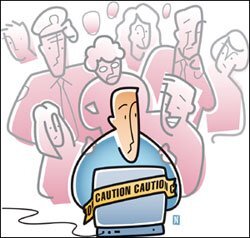Concerns about material posted to blogs and social networking sites such as MySpace and Facebook have been directed mostly at students, but teachers have gotten in trouble for online indiscretion, too. Before you post candid thoughts or personal photos, here’s what David Warlick, author of Classroom Blogging: A Teacher’s Guide to the Blogosphere, suggests you keep in mind:
Do…

• Use blogs and networking sites to share ideas and seek advice. Teaching is no longer the isolating profession it once was, Warlick says. “Involving yourself in a social network … can be an extremely valuable process because you’re connecting yourself to people and professionals who can help you do your job.”
• Seek out professional development on how to use these sites as instructional tools.
• Remember that social networks are public. Teachers using pseudonyms have been outed. “Something on YouTube or a blog, even, can be the talk of the town or the talk of the planet in a matter of days,” Warlick says.
Don’t…
• Do anything online that could hurt your professional reputation. “It’s no different than how you behave and how you dress, or how you present yourself when you go to the grocery store in town,” Warlick says.
• Post audio or video segments that you wouldn’t want identified as yours on the local TV news.
• Venture where you’re uncomfortable. Students might ask you to add them as “friends.” Tempting as it is to forge a connection with students, it’s safer to decline such requests, especially if their sites include material you wouldn’t allow in class.


